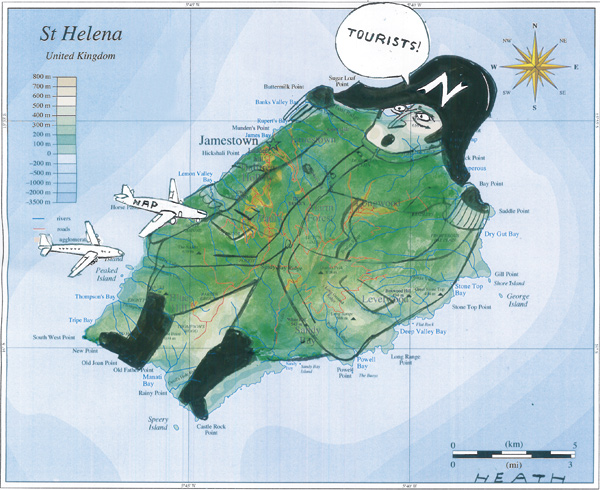St Helena, the island in the middle of the Atlantic Ocean on which Napoleon Bonaparte was exiled and died, is so far away from anywhere else that even pirates never discovered it. The only way to get there is by the last Royal Mail ship in existence, RMS St Helena, after a six-day journey from Cape Town, as I discovered this month when I visited in the course of researching my forthcoming biography of Napoleon.
Although the Emperor was violently seasick on his journey there in 1815, the seas were very calm for mine. Indeed, the calmness was almost eerie; for nearly a week we saw no planes in the sky, no other ships, nothing in the sea except some dolphins and flying fish on the last day, and no birds except two white-throated petrels. It was just sky and sea bisected by a totally flat horizon, for day after day after day.
St Helenans are called ‘Saints’, and they amused themselves on the journey playing deck quoits — a game that combines the skill of darts with the viciousness of croquet — and taking part in hard-fought general knowledge quizzes. I was a bit concerned when the ship’s doctor confidently asserted that the heart had two valves, rather than the generally accepted number of four, but otherwise the standard was pretty high. Sailing into the only harbour on the island, Jamestown, presented an incredibly imposing spectacle. Mists cleared to reveal dark red lava cliffs 600 feet high rising out of the sea on either side of the ship. Small wonder that Napoleon’s first response was: ‘It is not an attractive place. I should have done better to have stayed in Egypt.’ He must have known the moment he saw those massive rocks, the cannon defending them, and the Royal Navy frigates on 24-hour guard, that he was going to die on that tiny, 47 square miles of volcanic rock, which then as now only had around 4,000 inhabitants.
I’ll probably be the last biographer of Napoleon who’ll ever have to approach Jamestown by the sea route that he took, as in 2016 an airport is due to open there, which will cut the six-day journey down to a few hours. The British taxpayer — you, good Speccie reader — is spending a staggering £250 million to build what the veteran Times journalist Michael Binyon — who has fallen in love with the island — calls ‘one of the costliest, most challenging and most remote airports anywhere in the world’. The RMS St Helena will be discontinued after it opens, so there’ll be no way for future Bonaparte biographers to experience the same majesty and sense of despondent foreboding that those cliffs exerted so powerfully on the Emperor.
The airport represents something of a financial gamble, but as the island, a British Overseas Territory, is presently costing the taxpayer £30 million a year, it’s a justifiable one. The plan is for 30,000 eco-tourists to come every year, eventually allowing the island to pay for itself. The habitat is a weird combination of moonscape rocks with the occasional bit of cacti, but then lush vegetation in the very next valley. The diving and hiking are said to be great, but I wasn’t sold on the plans to turn the island into one of the world’s greatest bamboo exporters. And before any of the 30,000 tourists turn up, they are going to have to extend the total of hotel bedrooms available (presently standing at an impressive 18).
Saints have rather a schizoid attitude towards Napoleon; he is the only reason most people have heard of their island, yet it equates it in the public imagination with remoteness, exile and death. Many of the population are descended from slaves, and they complain that their ancestors weren’t consulted about him being sent there by the colonialist government in London. If they had been consulted though, I bet they’d have voted to take Napoleon, and enjoy their 15 minutes of world fame. They certainly wouldn’t otherwise have been able to sell little bars of soap in the shape of Napoleon’s head, such as the one that Michael Binyon kindly gave me (perhaps as a hint?).
Napoleon’s house at Longwood in the Deadwood Plain is kept up superbly, despite the fact that, as the curator and French honorary consul Michel Dancoisne-Martineau points out, just as in Napoleon’s day it’s enveloped in cloud for 330 days of the year, with all the problems of damp that that implies. It needs to be repainted every year due to the wind and rain, and it also suffers from the same infestations of rats, cockroaches, midges, termites and mosquitoes that plagued the Emperor. Monsieur Martineau deserves the Legion d’Honneur for the 28 years of love and attention he has dedicated to Longwood, which now looks exactly the same as it did on 5 May 1821, the day of Napoleon’s death.
One of the madder theories about how Napoleon died was that he somehow ingested arsenic through the wallpaper, although my commitment to my research wasn’t about to extend to my licking those bits of it that they’ve preserved from his day. I did lie down on the campaign bed in the room where Napoleon died, however, and looked through the spyhole he had cut into the shutters through which to watch the British sentries at the bottom of his garden. These reminded me that I’m exactly the same height as him, and this year I become the same age at which he died too. Since I’ve now been researching this book for as long as Napoleon spent on St Helena and Elba put together, my trip also reminded me to get on and actually write the book.






Comments